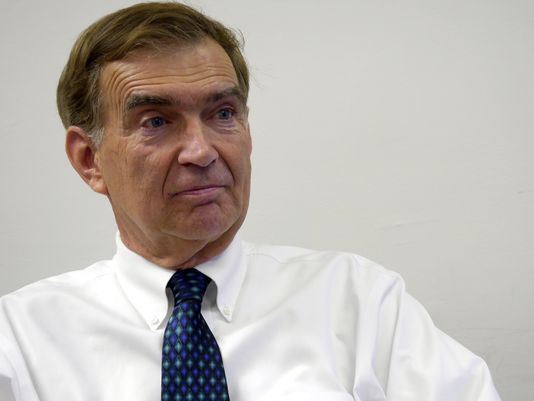For the gentleman from Augusta, retirement may be the biggest favor he could do for his fellow incumbents—regardless of who succeeds him.[read_more]
Hanger is, by all accounts, a man universally liked by his colleagues. However, his reputation for collegiality and a genial disposition among his fellow Senators hasn’t necessarily translated with the folks back home, where many in his 24th District instead known him best as one of the “Gang of Three” moderate Republican Senators. Together with the already retiring Sens. Walter Stosch (R-Henrico) and John Watkins (R-Powhatan), Hanger has a long history of siding with Democrats on key votes, often tipping the balance their way in the closely divided Senate.
Not surprisingly, then, Hanger has favored state-run open primaries as the method of his re-nomination, which allows Democrats in his heavily Republican district to participate in his nomination, thus keeping a conservative out of that seat. Hanger has been able to rely on a primary for renomination because of what is colloquially known as the Virginia Incumbent Protection Act (Va. Code 24.2-509), which allows incumbent members of the General Assembly to choose their own method of renomination, regardless of the wishes of the political party.
That all may change this year, as the Republican District Committee for the 24th Senate District decided to nominate its candidate for that seat by a party-run convention, with an explicit intention of challenging the constitutionality of the Incumbent Protection Act in court. From The Daily Progress:
The idea of an open primary however, where independent and Democratic voters could also weigh in, doesn’t sit well with members of the committee.
“The committee members are very much in agreement that the constitutional principal of freedom of association has been violated by this Incumbent Protection Act,” said committee chairman Ken Adams, who also serves as chairman of the Waynesboro Republican Committee. “This violation of the Constitution is offensive to the committee.”
Adams said he and the other committee members just don’t understand why members of other parties should be allowed to help choose the Republican nominee in an open primary. Instead, they’re asking the Virginia Board of Elections to overturn that portion of the Code and grant them a convention. While the incumbent has control of the process according to the Virginia Code, Adams and Wirth in his letter refer to the Plan of the Republican Party of Virginia, which gives the authority to select an election method to the legislative committee of each district. In his letter to the board, Wirth also calls section 24.2-509 (B) of the Virginia Code unconstitutional, saying that incumbent politicians should not have control of the process, due to the fact the U.S. Constitution grants political parties the right of association.
The 24th District Committee has apparently enlisted the help of the Staunton-based law firm of Nelson, McPherson, Summers and Santos to represent them in this case, which revolves around issues already decided in favor of the putative plaintiffs here in another Incumbent Protection Act case from 2007, Miller v. Brown, in which the U.S. Court of Appeals for the 7th Circuit invalidated the law as applied in nearly identical circumstances because of its infringement on the Party’s First Amendment rights. Paul Prados wrote about the legal aspects in more depth back in December.
Hanger has not yet indicated that he is running for the Republican nomination again, nor has he designated a primary as the statute allows. (The latest news on his website is from last August). Under Virginia law, if the method of nomination for a General Assembly seat is not designated by the incumbent running for re-election by Tuesday, February 24th, the State Board of Elections is to accept the designation made by the Party (i.e., a party-run convention).
It is probably safe to say that Hanger would badly trail his two announced challengers, Dan Moxley and Marshall Pattie, in a convention setting open only to Republicans. If Hanger accepted the convention determination made by the 24th District Committee, the veteran of 28 years in the General Assembly would likely face an ignoble end to his public service career.
On the other hand, if Hanger were to force the issue and designate by Tuesday a state-run open primary as his method of renomination, he would probably trigger the litigation that has been waiting in the wings, which stands a very good chance of eliminating the biggest protection for incumbents in Virginia law, once and for all.**
But, if you’re Emmet Hanger and are faced with the possibility of leaving a legacy of defeat and upsetting the applecart for many of your colleagues for years to come, the best option may be to follow the example of Hanger’s old famously unconservative GOP colleague in the Senate, John Chichester, who made the choice to retire when faced with a similar threat in 2007 (and who has made a new life for himself by endorsing every statewide Democrat candidate since).
So, what will it be? Will Hanger choose to retire, thus ensuring preservation of the Incumbent Protection Act for at least another election cycle, or will he tough it out and see if he can fend off the legal challenge and maybe hold on to his seat for another 4 years? I think the odds favor the former option.
**Note: I have had no contact with the plaintiffs in this regard, so do not know precisely what their plans are…I am only making a surmise based on the available facts. Further, I know that certain lobbyists and consultants with a pecuniary interest in the longevity of the Incumbent Protection Act have organized a legal team to come up with the best possible defenses of the law, so a constitutional challenge here might not necessarily be a slam dunk.

